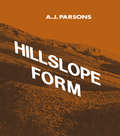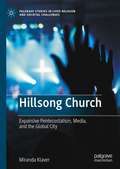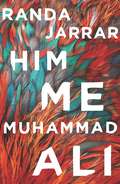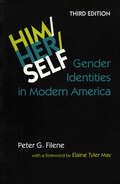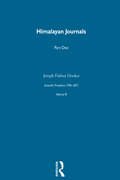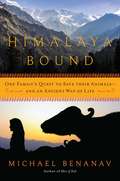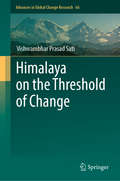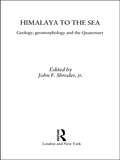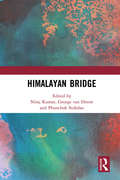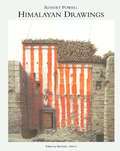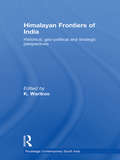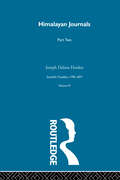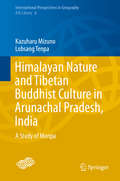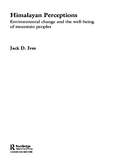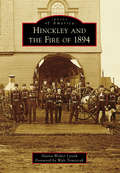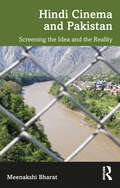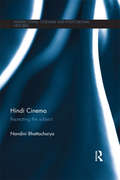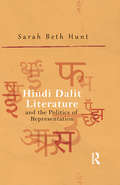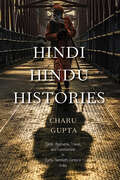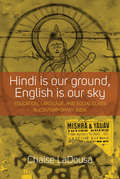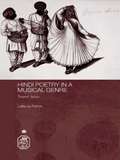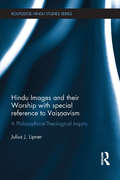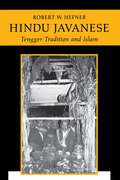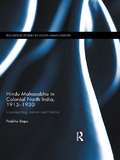- Table View
- List View
Hillslope Form
by A. J. ParsonsThe study of hillslopes is a central element of geomorphology, and has been the cause of many of the major methodological disputes in the subject. This book describes the present state of knowledge of hillslope form, the results of measurements of hillslope form and points to unresolved problems in the understanding of it. The book deals with observed variations in hillslope form across the surface of the earth and concludes by examining the influence of man on hillslopes and assessing the contribution that the understanding of natural hillslopes may make to the management of man-made inclines.
Hillsong Church: Expansive Pentecostalism, Media, and the Global City (Palgrave Studies in Lived Religion and Societal Challenges)
by Miranda KlaverThis book highlights the expansion of the influential Pentecostal Hillsong Church global megachurch network from Australia across global cities. Ethnographic research in Amsterdam and New York City shows that global cities harbor nodes in transnational religious networks in which media play a crucial role. By taking a lived religion approach, media is regarded as integral part of everyday practices of interaction, expression and consumption of religion. Key question raised is how processes of mediatization shape, alter and challenge this thriving cosmopolitan expression of Pentecostalism. Current debates in the study of religion are addressed: religious belonging and community in global cities; the interrelation between media technology, religious practices and beliefs; religion, media and social engagement in global cities; media and emerging modes of religious leadership and authority. In this empirical study, pressing societal issues like institutional responses to sexual abuse of children, views on gender roles, misogyny and mediated constructions of femininity are discussed.
Him, Me, Muhammad Ali
by Randa JarrarIn her first story collection, Jarrar employs a particular, rather than rhetorical approach to race and gender. Thus we have "How Can I Be of Use to You," with its complicated relationship between a distinguished Egyptian feminist and her young intern, demonstrating that gender politics are never straightforward, and both generations-old and new-take advantage of each other. There's also a healthy dose of magic surrealism, as in the wild and witty story "Zelda the Halfie" which follows a breed of half Ibexes/half humans and their various tribulations. The writing is peppered with gorgeous imagery: a moon reflected in an ice cream scoop, breath that runs ahead of its body, and two apartments in a high rise whose tenants precisely mirror each other.Randa Jarrar is the author of a highly successful novel, A Map of Home, which received an Arab-American Book Award and was named one of the best novels of 2008 by the Barnes & Noble Review. She grew up in Kuwait and Egypt, and moved to the United States after the first Gulf War. Her work has appeared in the New York Times Magazine, the Utne Reader, Salon.com, Guernica, the Rumpus, the Oxford American, Ploughshares, and more. She blogs for Salon, and lives in California.
Him/Her/Self: Gender Identities in Modern America
by Peter G. FileneWhen first published in 1975, Him/Her/Self was a pathbreaking book. At a time when scholars were just beginning to explore women's history, Peter Filene expanded his inquiry to include both both genders. He was the first to claim the men, too, had a history grounded in gendered experience. Since then much has changed, not only in the lives and attitudes of American men and women, but in the ways that historians think about gender. But Him/Her/Self remains the only book that analyzes the interactions between American men and women comprehensively during the past century.In this third edition, Filene brings his concise and forceful analysis of 20th-century gender history up to the present. He describes the new men's movements of the 1980s and 1990s, ranging from pro-feminist to anti-feminist. He expands his discussion of the gay and lesbian experience, especially in the years since AIDS. He assesses the women's movement, weighing both its achievements and the antifeminist reactions of the past quarter-century. Finally, he enlarges the conceptual scope of the book, focusing not only on social roles of men and women but also on their dynamic sense of identity—of self in historical time."When Him/Her/Self first appeared, women's history was in its infancy. Gender as a category of analysis was barely a glow on the scholarly horizon, and the idea that manhood was a topic of historical investigation was practically unimagined. In that early dawn of feminist scholarship, Peter Filene's pioneering work was a godsend. It was essential reading for both undergraduate and graduate students eager to understand the workings of gender in history and desperate for models of scholarship that broke the mold of 'traditional' historical writing. Peter Filene's path breaking study did both."—Elaine Tyler May, from the Foreword
Hima Jour V1:Sci Tra 1790-1877
by Joseph Dalton HookerFirst published in 2003. Sir Joseph Hooker (1817-1911) was one of the greatest British botanists and explorers of the nineteenth century. He succeeded his father as Director of the Royal Botanic Gardens, Kew, and was a close friend and supporter of Charles Darwin. His journey to the Himalayas and India was undertaken between 1847 and 1851 to collect plants for Kew, and his account, published in 1854, was dedicated to Darwin. Hooker collected some 7,000 species in India and Nepal, and carried out surveys and made maps which proved of economic and military importance to the British. He makes many observations about the inhabitants of the areas he visited, making this volume a useful resource for anyone interested in nineteenth-century India.
Himalaya Bound: One Family's Quest To Save Their Animals--and An Ancient Way Of Life
by Michael BenanavA gorgeous work of literary journalism that follows a nomadic family’s fraught migration to the high Himalayan plains, as a changing world closes in around them. Following his vivid account of traveling with one of the last camel caravans on earth in Men of Salt, Michael Benanav now brings us along on a journey with a tribe of forest-dwelling nomads in India. Welcomed into a family of nomadic water buffalo herders, he joins them on their annual spring migration into the Himalayas. More than a glimpse into an endangered culture, this superb adventure explores the relationship between humankind and wild lands, and the dubious effect of environmental conservation on peoples whose lives are inseparably intertwined with the natural world. The migration Benanav embarked upon was plagued with problems, as government officials threatened to ban this nomadic family—and others in the Van Gujjar tribe—from the high alpine meadows where they had summered for centuries. Faced with the possibility that their beloved buffaloes would starve to death, and that their age-old way of life was doomed, the family charted a risky new course, which would culminating in an astonishing mountain rescue. And Benanav was arrested for documenting the story of their plight. Intimate and enthralling, Himalaya Bound paints a sublime picture of a rarely-seen world, revealing the hopes and fears, hardships and joys, of a people who wonder if there is still a place for them on this planet. Laced with stories of tribal cultures from India to Yellowstone, from Jordan to Kenya, Benanav deftly wends through the controversial terrain where Western ways of protecting the environment clash with indigenous understandings of nature. Himalaya Bound celebrates and mourns an ancient way of life, while revealing an unlikely battleground in the fight to save the earth.
Himalaya on the Threshold of Change (Advances in Global Change Research #66)
by Vishwambhar Prasad SatiThis book provides a unique and comprehensive assessment of the changes that have been taking place in the Himalayas. It describes in detail all the aspects of change, both natural and cultural, along with their implications, and suggests policy measures to help mitigate them. The book is divided into two major sections – on natural changes and cultural changes – and 11 chapters: an introduction, six addressing changes that concern natural aspects, and four exploring cultural changes and presenting the book’s conclusions. The content is based on a study conducted using a participatory observation/empirical method. Time series data from secondary sources is also included, helping to analyze the various changes. The findings are presented in the form of color graphs, models, maps, photographs, and tables. The book offers a valuable resource for policymakers, and will prove equally useful for all other stakeholders, e.g. researchers, students and development agents.
Himalaya to the Sea: Geology, Geomorphology and the Quaternary
by Jr. John F. ShroderFirst Published in 2004. Routledge is an imprint of Taylor & Francis, an informa company.
Himalayan Bridge
by Niraj Kumar; George van Driem; Phunchok StobdanThe centrality of the Himalayas as a connecting point or perhaps a sacred core for the Asian continent and its civilisations has captivated every explorer and scholar. The Himalaya is the meeting point of two geotectonic plates, three biogeographical realms, two ancient civilisations, two different language streams and six religions.This book is about the determinant factors which are at work in the Himalayas in the context of what it constitutes in terms of its spatiality, legends and myths, religious beliefs, rituals and traditions. The book suggests that there is no single way for understanding the Himalayas. There are layers of structures, imposition and superimposition of human history, religious traits and beliefs that continue to shape the Asian dynamics. An understanding of the ultimate union of the Himalayas, its confluences and its bridging role is essential for Asian balance. This book is a collaborative effort of an internationally acclaimed linguist, a diplomat-cum-geopolitician and a young Asianist. It provides countless themes that will be intellectually stimulating to scholars and students with varied interests. Please note: This title is co-published with KW Publishers, New Delhi. Taylor & Francis does not sell or distribute the Hardback in India, Pakistan, Nepal, Bhutan, Bangladesh and Sri Lanka.
Himalayan Drawings
by PowellFirst published in 2002. Routledge is an imprint of Taylor & Francis, an informa company.
Himalayan Frontiers of India: Historical, Geo-Political and Strategic Perspectives (Routledge Contemporary South Asia Series)
by K. WarikooThe Himalaya, which is a great natural frontier for India, symbolises India’s spiritual and national consciousness. The Himalayan region displays wide diversity of cultural patterns, languages, ethnic identities and religious practices. Along the Himalayas converge the boundaries of South and Central Asian countries, which lend a unique geopolitical and geo-strategic importance to this region. This book provides a comprehensive analysis of historical, geo-political and strategic perspectives on the Himalayan Frontiers of India. Drawing on detailed analyses by academics and area specialists, it explains the developments in and across the Himalayas and their implications for India. Topics such as religious extremism, international and cross border terrorism, insurgency, drugs and arms trafficking are discussed by experts in their respective field. Himalayan Frontiers of India will be of interest to scholars in South and Central Asian studies, International Relations and Security Studies.
Himalayan Journals, Volume II: Scientific Travellers 1790-1877 Volume 2
by Joseph Dalton HookerThis is Volume II of the Himalayan Journals or the notes of a naturalist travelling in Bengal, The Sikkim and Nepal Himalayas, the Khasia Mountains.
Himalayan Nature and Tibetan Buddhist Culture in Arunachal Pradesh, India
by Kazuharu Mizuno Lobsang TenpaThis is the first book to systematically describe the formation and historical changes of the Monpa people's area (Monyul) through its nature, society, culture, religion, agriculture and historically deep ties with Bhutan, Tibet and the Tibetan Buddhist faith. The state of Arunachal Pradesh is located in the northeastern part of India, surrounded by the borders of Assam, Bhutan, and Tibet (China). There has been a long history of conflict over the sovereignty of this area between India and China. Foreigners were prohibited from entering the state until the 1990s and the area has been veiled in secrecy until recently. Thus, there are not many academically researched works on the region. This book serves as an essential guide for anyone who would like to learn about a unique geographical area of Monpa.
Himalayan Perceptions: Environmental Change and the Well-Being of Mountain Peoples (Routledge Studies in Physical Geography and Environment)
by Jack IvesIn the 1970s and 1980s many institutions, agencies and scholars believed that the Himalayan region was facing severe environmental disaster, due primarily to rapid growth in population that has caused extensive deforestation, which in turn has led to massive landsliding and soil erosion. This series of assumptions was first challenged in the book: The Himalayan Dilemma (1989: Ives and Messerli, Routledge). Nevertheless, the environmental crisis paradigm still commands considerable support, including logging bans in the mountain watersheds of China, India, and Thailand, and is constantly being promoted by the news media. Himalayan Perceptions identifies the confusion of misunderstanding, vested interests, changing perceptions, and institutional unwillingness to base development policy on sound scientific knowledge. It analyzes the large amount of new research published since 1989 and totally refutes the entire construct. It examines recent social and economic developments in the region and identifies warfare, guerrilla activities, and widespread oppression of poor ethnic minorities as the primary cause for the instability that pervades the entire region. It is argued that the development controversy is further confounded by exaggerated reporting, even falsification, by news media, environmental publications, and agency reports alike.
Hinckley and the Fire of 1894 (Images of America)
by Walt Tomascak Alaina Wolter LysethImagine a force in nature more powerful than multiple atomic bombs--that was the Great Hinckley Fire of September 1, 1894. In only four hours, the fire incinerated over 400 square miles of forest, killed at least 418 settlers and an unknown number of forest-dwelling Native Americans, and destroyed six towns in a firestorm of flame. The elements that led to this unprecedented catastrophe included careless logging practices, a drought, freakish weather, and suspected sparks from passing locomotives. The story of the 1894 fire is a saga of devastation, heartbreak, heroism, survival, hope, and rebuilding that captured worldwide attention. Recently discovered photographs provide a backdrop for a fresh look at the events surrounding the disaster and the courage of the pioneers who survived to tell the tale.
Hindenburg Disaster (Cornerstones of Freedom)
by R. Conrad SteinDescribes the development and early flights of airships and the disastrous crash of the Hindenburg at an airfield in New Jersey in 1937.
Hindi Cinema and Pakistan: Screening the Idea and the Reality
by Meenakshi BharatEver since the 1947 partition of the Indian subcontinent, Mumbai-based Hindi cinema has been returning compulsively to the idea of Pakistan, sometimes as the desirable other, sometimes as the horrifying antagonist. Hindi Cinema and Pakistan traces the genesis and development of this theme in Hindi cinema in the 1950s, showcasing its relevance as a tool that both reflects and shapes how India sees its neighbour, the India–Pakistan relationship, and itself.The book is a serious, multi-platform, multi-pronged exploration of the appearances, invocations, representations and treatment of Pakistan and Pakistanis in Hindi cinema. It follows Hindi cinema’s efforts to come to terms with the ‘idea’ and ‘reality’ of Pakistan. Through in-depth analyses of the enmity and rivalry between the two subcontinental nations in Partition films, thrillers, epic war films and sports films, to screen depictions of the shared cultural past and similarities in films on cross-border love or in films that show a reaching out through humour, this book investigates the visualization of Pakistan and contextualizes these representations within the broader frameworks of India’s political, socio-cultural and popular discourse.The extensive reach of the in-depth textual analyses of Hindi cinema will make this volume interesting and valuable both to the lay reader and to researchers and academics of cultural studies, media and film studies, and the study of socio-psychological violence in media and culture.
Hindi Cinema: Repeating the Subject (Intersections: Colonial and Postcolonial Histories)
by Nandini BhattacharyaHindi Cinema is full of instances of repetition of themes, narratives, plots and characters. By looking at 60 years of Hindi cinema, this book focuses on the phenomenon as a crucial thematic and formal code that is problematic when representing the national and cinematic subject. It reflects on the cinema as motivated by an ongoing crisis of self-formation in modern India. The book looks at how cinema presents liminal and counter-modern identities emerging within repeated modern attempts to re-enact traumatic national events so as to redeem the past and restore a normative structure to happenings. Establishing structure and event as paradigmatic poles of a historical and anthropological spectrum for the individual in society, the book goes on to discuss cinematic portrayals of violence, gender embodiment, religion, economic transformations and new globalised Indianness as events and sites of liminality disrupting structural aspirations. After revealing the impossibility of accurate representation of incommensurable and liminal subjects within the historiography of the nation-state, the book highlights how Hindi cinema as an ongoing engagement with the nation-state as a site of eventfulness draws attention to the problematic nature of the thematic of nation. It is a useful study for academics of Film Studies and South Asian Culture.
Hindi Dalit Literature and the Politics of Representation
by Sarah Beth HuntThis study explores how Dalits in north India have used literature as a means of protest against caste oppression. Including fresh ethnographic research and interviews, it traces the trajectory of modern Dalit writing in Hindi and its pivotal role in the creation, rise and reinforcement of a distinctive Dalit identity. The book challenges the existing impression of Hindi Dalit literature as stemming from the Dalit political assertion of the 1980s and as being chiefly imitative of the Marathi Dalit literature model. Arguing that Hindi Dalit literature has a much longer history in north India, it examines two differing strands that have taken root in Dalit expression — the early ‘popular’ production of smaller literary pamphlets and journals at the beginning of the 20th century and more contemporary modes such as autobiographies, short stories and literary criticism. The author highlights the ways in which such various forms of literary works have supported the proliferation of an all-encompassing identity for the so-called ‘untouchable’ castes. She also underscores how these have contributed to their evolving political consciousness and consolidation of newer heterogeneous identities, making a departure from their long-perceived image. The work will be important for those in Dalit studies, subaltern history, Hindi literature, postcolonial studies, political science and sociology as well as the informed general reader.
Hindi Hindu Histories: Caste, Ayurveda, Travel, and Communism in Early-Twentieth-Century India (SUNY series in Hindu Studies)
by Charu GuptaExplores how four public intellectuals in North India imagined freedom and Hindi-Hindu nationhood through their writings on caste, Ayurveda, travel, and communism.What did everyday Hinduism in India look like a hundred years ago? Were its practices more varied and less politically curtailed than now? Hindi Hindu Histories provides illuminating historical accounts of Hindu life through individual actors, autobiographical narratives, and genres in the Hindi print-public culture of early twentieth-century North India. It focuses on four fascinating figures: a successful woman doctor in the Indigenous medical regime, a globe-trotting Hindu ascetic who opposed Gandhi, an anticaste campaigner who spoke for sexual equality, and a Hindu communist who envisioned an egalitarian utopia in the world of labor. These public intellectuals harbored vernacular dreams of freedom and Hindi-Hindu nationhood through their vantage points of caste, Ayurveda, travel, and communism. Opening up a vast and under-explored Hindi archive, this book presents a dynamic spectacle of a plural Hindi-Hindu universe of facets that coexisted, challenged each other, and comprised an idea of Hinduness far more inclusive than anything conceivable in the present moment.
Hindi Is Our Ground, English Is Our Sky: Education, Language, and Social Class in Contemporary India
by Chaise LadousaA sea change has occurred in the Indian economy in the last three decades, spurring the desire to learn English. Most scholars and media venues have focused on English exclusively for its ties to processes of globalization and the rise of new employment opportunities. The pursuit of class mobility, however, involves Hindi as much as English in the vast Hindi-Belt of northern India. Schools are institutions on which class mobility depends, and they are divided by Hindi and English in the rubric of "medium," the primary language of pedagogy. This book demonstrates that the school division allows for different visions of what it means to belong to the nation and what is central and peripheral in the nation. It also shows how the language-medium division reverberates unevenly and unequally through the nation, and that schools illustrate the tensions brought on by economic liberalization and middle-class status.
Hindi Poetry in a Musical Genre: Thumri Lyrics (Royal Asiatic Society Books)
by Lalita du PerronIndian classical music has long been fascinating to Western audiences, most prominently since the Beatles' sessions with Ravi Shankar in the 1960s. This fascination with the musical genre still prevails in the twenty-first century. Hindi Poetry in a Musical Genre examines Thumri Lyrics, a major genre of Hindustani music, from a primarily linguistic perspective. On a cultural level, it discusses the interface between devotional and secular poetry. Furthermore, it explains the impact of social and political change on the musical life on North India. Well-written and thoroughly researched, this book is a valuable contribution to the field of South Asian studies. It will be interesting to academics across the discipline, including linguistics, politics, sociology, cultural and gender studies.
Hindu Images and their Worship with special reference to Vaisnavism: A philosophical-theological inquiry (Routledge Hindu Studies Series)
by Julius J. LipnerHinduism comprises perhaps the major cluster of religio-cultural traditions of India, and it can play a valuable role in helping us understand the nature of religion and human responses to life. Hindu image-worship lies at the core of what counts for Hinduism – up-front and subject to much curiosity and misunderstanding, yet it is a defining feature of this phenomenon. This book focuses on Hindu images and their worship with special reference to Vaiṣṇavism, a major strand of Hinduism. Concentrating largely, but not exclusively, on Sanskritic source material, the author shows in the course of the book that Hindu image-worship may be understood via three levels of interpretation: the metaphysical/theological, the narratival or mythic, and the performative or ritual. Analysing the chief philosophical paradigm underlying Hindu image-worship and its implications, the book exemplifies its widespread application and tackles, among other topics such as the origins of image-worship in Hinduism, the transition from Vedic to image worship, a distinguishing feature of Hindu images: their multiple heads and limbs. Finally, with a view to laying the grounds for a more positive dialogic relationship between Hinduism and the "Abrahamic" faiths, which tend to condemn Hindu image-worship as "idolatry", the author examines the theological explanation and justification for embodiment of the Deity in Hinduism and discusses how Hinduism might justify itself against such a charge. Rich in Indological detail, and with an impressive grasp of the philosophical and theological issues underlying Hindu material culture, and image-worship, this book will be of interest to academics and others studying theology, Indian philosophy and Hinduism.
Hindu Javanese: Tengger Tradition and Islam
by Robert W. HefnerThe description for this book, Hindu Javanese: Tengger Tradition and Islam, will be forthcoming.
Hindu Mahasabha in Colonial North India, 1915-1930: Constructing Nation and History (Routledge Studies in South Asian History)
by Prabhu BapuHindu nationalism has emerged as a political ideology represented by the Hindu Mahasabha. This book explores the campaign for Hindu unity and organisation in the context of the Hindu-Muslim conflict in colonial north India in the early twentieth century. It argues that India's partition in 1947 was a result of the campaign and politics of the Hindu rightwing rather than the Islamist politics of the Muslim League alone. The book explains that the Mahasabha articulated Hindu nationalist ideology as a means of constructing a distinct Hindu political identity and unity among the Hindus in conflict with the Muslims in the country. It looks at the Mahasabha’s ambivalence with the Indian National Congress due to an extreme ideological opposition, and goes on to argue that the Mahasabha had its ideological focus on an anti-Muslim antagonism rather than the anti-British struggle for India’s independence, adding to the difficulties in the negotiations on Hindu-Muslim representation in the country. The book suggests that the Mahasabha had a limited class and regional base and was unable to generate much in the way of a mass movement of its own, but developed a quasi-military wing, besides its involvement in a number of popular campaigns. Bridging the gap in Indian historiography by focusing on the development and evolution of Hindu nationalism in its formative period, this book is a useful study for students and scholars of Asian Studies and Political History.
